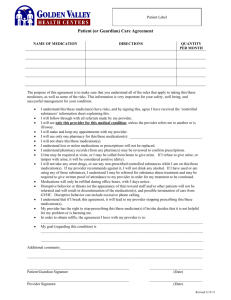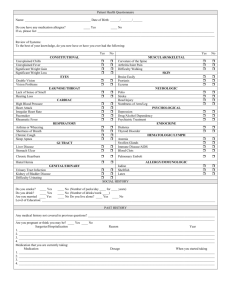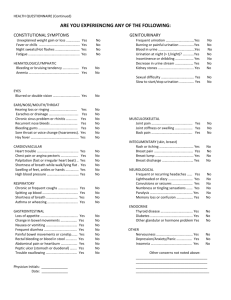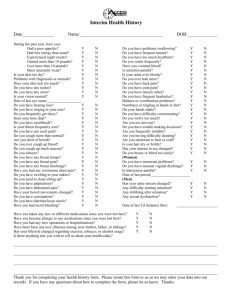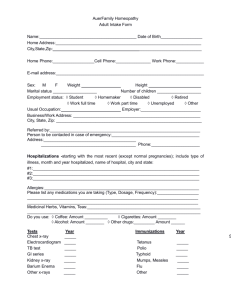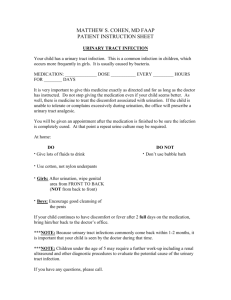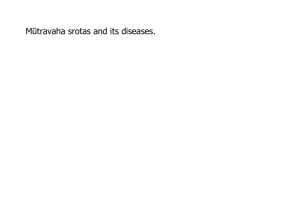MOUNTAIN PEAKS UROLOGY, P
advertisement
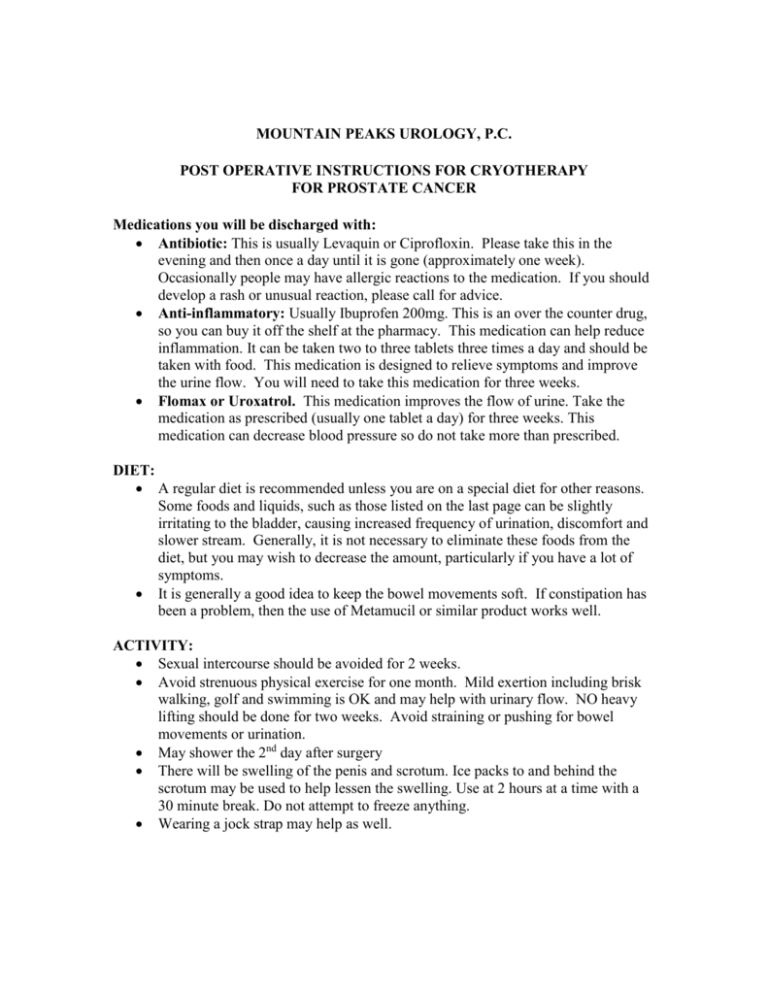
MOUNTAIN PEAKS UROLOGY, P.C. POST OPERATIVE INSTRUCTIONS FOR CRYOTHERAPY FOR PROSTATE CANCER Medications you will be discharged with: Antibiotic: This is usually Levaquin or Ciprofloxin. Please take this in the evening and then once a day until it is gone (approximately one week). Occasionally people may have allergic reactions to the medication. If you should develop a rash or unusual reaction, please call for advice. Anti-inflammatory: Usually Ibuprofen 200mg. This is an over the counter drug, so you can buy it off the shelf at the pharmacy. This medication can help reduce inflammation. It can be taken two to three tablets three times a day and should be taken with food. This medication is designed to relieve symptoms and improve the urine flow. You will need to take this medication for three weeks. Flomax or Uroxatrol. This medication improves the flow of urine. Take the medication as prescribed (usually one tablet a day) for three weeks. This medication can decrease blood pressure so do not take more than prescribed. DIET: A regular diet is recommended unless you are on a special diet for other reasons. Some foods and liquids, such as those listed on the last page can be slightly irritating to the bladder, causing increased frequency of urination, discomfort and slower stream. Generally, it is not necessary to eliminate these foods from the diet, but you may wish to decrease the amount, particularly if you have a lot of symptoms. It is generally a good idea to keep the bowel movements soft. If constipation has been a problem, then the use of Metamucil or similar product works well. ACTIVITY: Sexual intercourse should be avoided for 2 weeks. Avoid strenuous physical exercise for one month. Mild exertion including brisk walking, golf and swimming is OK and may help with urinary flow. NO heavy lifting should be done for two weeks. Avoid straining or pushing for bowel movements or urination. May shower the 2nd day after surgery There will be swelling of the penis and scrotum. Ice packs to and behind the scrotum may be used to help lessen the swelling. Use at 2 hours at a time with a 30 minute break. Do not attempt to freeze anything. Wearing a jock strap may help as well. Normal findings after Cyrotherapy: You may experience a number of findings after cryotherapy that occur in some patients, and should not be cause for alarm. These include: Blood in the urine. After discharge from the hospital, your urine may have some blood in it and may appear red, but without any clots in it. This occurs to some degree in all patients after cryotherapy and is not cause for alarm. Your urine should clear in approximately 24 hours after the procedure. Scrotal and penile swelling. This occurs about 2-3 days after the procedure and is caused by tissue swelling that temporarily blocks the lymph drainage. This is painless and resolves in less than one week normally. Lying down for short periods of time during the day will improve the swelling. Small amounts of bloody discharge from the end of your penis. This can occur for up to 6 weeks after the procedure and is not cause for alarm. It is due to some discharge from the urethra in the area of the prostate. Some numbness in the head of the penis. Occasionally, when a large amount of freezing is required, the nerve that supplies sensation to one or both sides of the head of the penis may be affected. After a number of months the sensation returns. Findings of concern after Cryotherapy: There are certain symptoms that you may experience which might indicate a problem after cyrotherapy. If you should have any of these symptoms described below after the procedure, do not hesitate to contact us. Some symptoms of concern would include: Fever, chills, worsening pelvic pain, or pain during urination. These symptoms may indicate an infection. Please call us promptly. Decreased urinary stream, lower abdominal pain. Occasionally after Foley catheter removal, some patients may have difficulty urinating or decreased urinary stream. This may indicate urinary retention: not being able to empty the bladder completely. You may feel an urgent need to urinate but you simply can’t or just dribble instead of an actual stream. Your lower abdomen may feel bloated. You should contact our office promptly so that we may evaluate this. If after office hours you should go to the hospital. If you have any of the following symptoms please contact us promptly: foul smelling urine, passing of air or air bubbles in the urine, or diarrhea after urination. This could indicate a urethra-rectal fistula and while very rare, should be investigated immediately.
